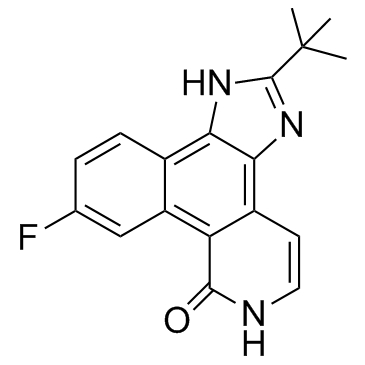457081-03-7
| Name | Pyridone 6 |
|---|---|
| Synonyms |
IZA
Merck-5 9-Fluoro-2-(2-methyl-2-propanyl)-1,6-dihydro-7H-benzo[h]imidazo[4,5-f]isoquinolin-7-one JAK Inhibitor I |
| Description | Pyridone 6 is a pan-JAK inhibitor, which potently inhibits the JAK kinase family, with IC50s of 1 nM for JAK2 and TYK2, 5 nM for JAK3, and 15 nM for JAK1, while displaying significantly weaker affinities (130 nM to >10 mM) for other protein tyrosine kinases. |
|---|---|
| Related Catalog | |
| Target |
JAK2:1 nM (IC50) Tyk2:1 nM (IC50) JAK3:5 nM (IC50) Murine JAK1:15 nM (IC50) CDK2:3.3 μM (IC50) cAMP-dependent kinase:7.1 μM (IC50) Csk:2.1 μM (IC50) Hck:7.7 μM (IC50) Fyn T:0.5 μM (IC50) p38:11 μM (IC50) MAPK:1.78 μM (IC50) Mek:0.16 μM (IC50) IκB Kinase 2:0.3 μM (IC50) KDR:1.4 μM (IC50) Flt-1:1.52 μM (IC50) Flt-4:0.69 μM (IC50) FGFR:1.48 μM (IC50) FGFR2:0.94 μM (IC50) Tek:24 μM (IC50) PDGFR:1.49 μM (IC50) PKC(α):1.2 μM (IC50) |
| In Vitro | Pyridone 6 is tested as an inhibitor of 21 other protein kinases; Pyridone 6 inhibits these kinases with IC50s ranging from 130 nM to >10 μM. Pyridone 6 inhibits IL2 driven proliferation of CTLL cells with IC50=0.1 μM and IL4 driven proliferation with IC50=0.052 μM[1]. Pyridone 6 (P6) is shown to inhibit kinase by interacting within the ATP-binding cleft of each JAK. The IC50 of Pyridone 6 is 3 nM for all of these cytokines; this is comparable to the reported IC50s of Pyridone 6 for JAK2, Tyk2, and JAK3. Pyridone 6 strongly inhibits Th2 and modestly inhibits Th1, whereas it enhances Th17 development when present within a certain range of concentrations. Pyridone 6 reduces IFN-γ and IL-13, whereas it enhances IL-17 and IL-22 expression. Pyridone 6 also inhibits both Th1 and Th2 development, whereas it promotes Th17 differentiation from naive T cells when present within a certain range of concentrations[2]. |
| In Vivo | Pyridone 6 (P6) delays the onset and reduced the magnitude of skin disease in an AD-like skin-disease model of NC/Nga mice. P6-nano strongly ameliorates atopic dermatitis (AD) in NC/Nga mice, exerting an effect comparable to that of betamethasone ointment, a commonly used drug, which also tested as a positive control. In contrast, empty polylactic acid with glycolic acid (PLGA) nanoparticles (C-nano) seemed to have no effect[2]. |
| Cell Assay | Naive CD4+ T cells are treated with various concentrations of Pyridone 6 (10 and 30 nM) in RPMI 1640 medium 1 h before the appropriate cytokines are added to create each Th-differentiating condition. Immunoblotting is performed using antiphospho-STAT protein Abs or anti-total STAT protein Abs[2]. |
| Animal Admin | Mice[2] NC/Nga mice are used at the age of 10-15 wk. To assess the effect of Pyridone 6 treatment on AD symptoms, nanoparticles containing Pyridone 6 (2 mg/body) or empty nanoparticles as a negative control (C-nano) are dissolved in 0.1 mL saline and administered s.c. 1 d after Dfb ointment application; this treatment is repeated twice a week. To assess the effects of recombinant murine IL-17 and IL-22, these cytokines (50 μg/kg) or 100 μL PBS is administered for the same duration as the nanoparticles. Twenty milligrams of 0.064% betamethasone ointment are applied to the dorsal lesion of mice once a week[2]. |
| References |
| Density | 1.3±0.1 g/cm3 |
|---|---|
| Boiling Point | 646.5±55.0 °C at 760 mmHg |
| Molecular Formula | C18H16FN3O |
| Molecular Weight | 309.337 |
| Flash Point | 344.8±31.5 °C |
| Exact Mass | 309.127747 |
| PSA | 61.80000 |
| LogP | 3.00 |
| Vapour Pressure | 0.0±1.9 mmHg at 25°C |
| Index of Refraction | 1.681 |
| Storage condition | 2-8℃ |
